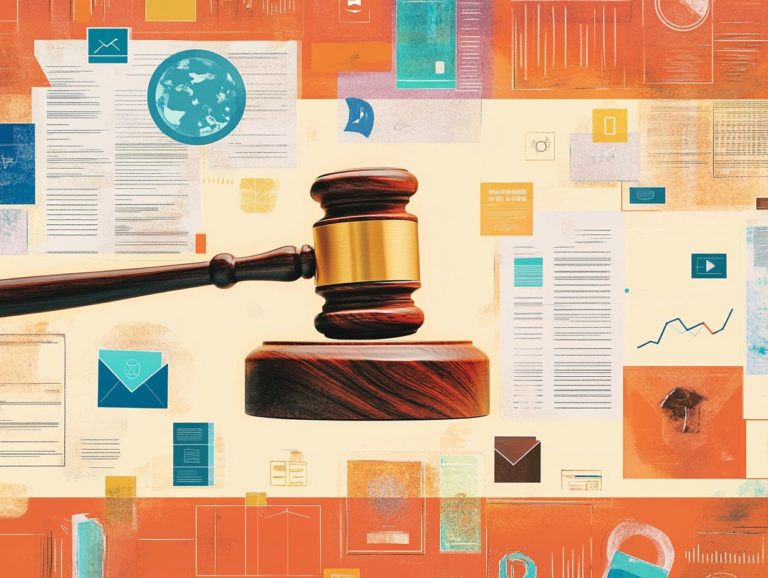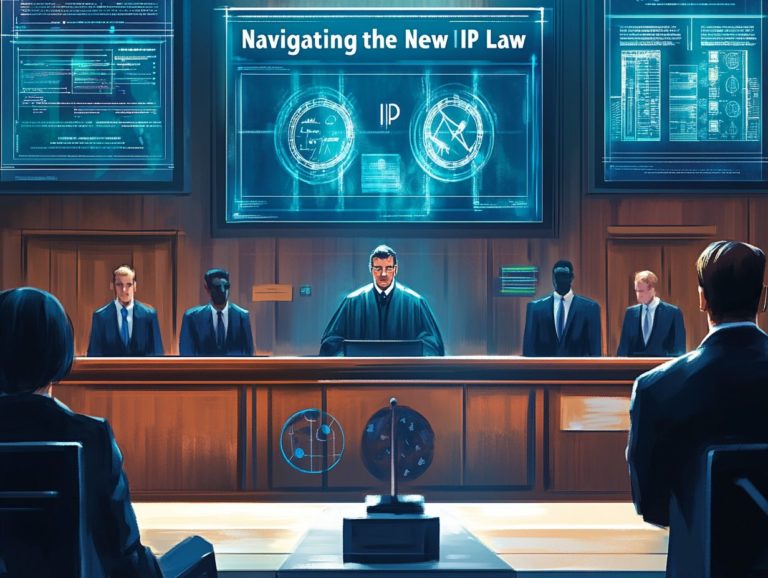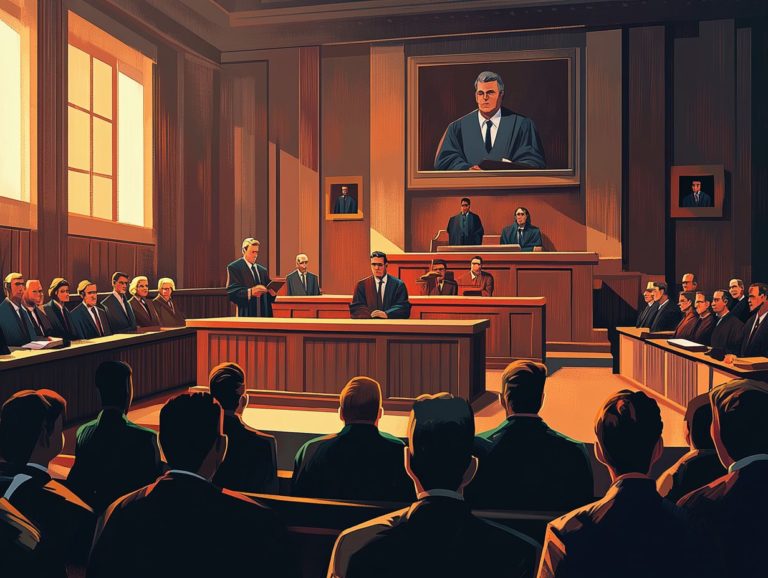How to Protect Your IP Rights During Litigation
Understanding intellectual property rights is crucial for creators and business leaders today. Don’t miss out on these essential protections for your valuable ideas!
This article covers various types of IP rights, the common disputes that may arise, and the critical role litigation plays in safeguarding your valuable assets.
You ll discover the necessary steps to protect your rights during legal challenges, including effective evidence gathering and collaborating with legal experts.
Uncover best practices for maintaining the integrity of your IP and navigating the complexities of international regulations. Join us now to learn how to safeguard your intellectual property.
Contents
- Key Takeaways:
- Understanding Intellectual Property Rights
- Litigation and Intellectual Property Rights
- Steps to Protect Your IP Rights During Litigation
- Important Considerations for Protecting IP Rights
- Best Practices for Protecting IP Rights
- Frequently Asked Questions
- What are IP rights and why is it important to protect them during litigation?
- What are the common types of IP rights that may be involved in litigation?
- What steps can I take to protect my IP rights during litigation?
- What are some common challenges to protecting IP rights during litigation?
- Can I still protect my IP rights if I cannot afford litigation?
- What should I do if I believe my IP rights have been infringed upon?
Key Takeaways:
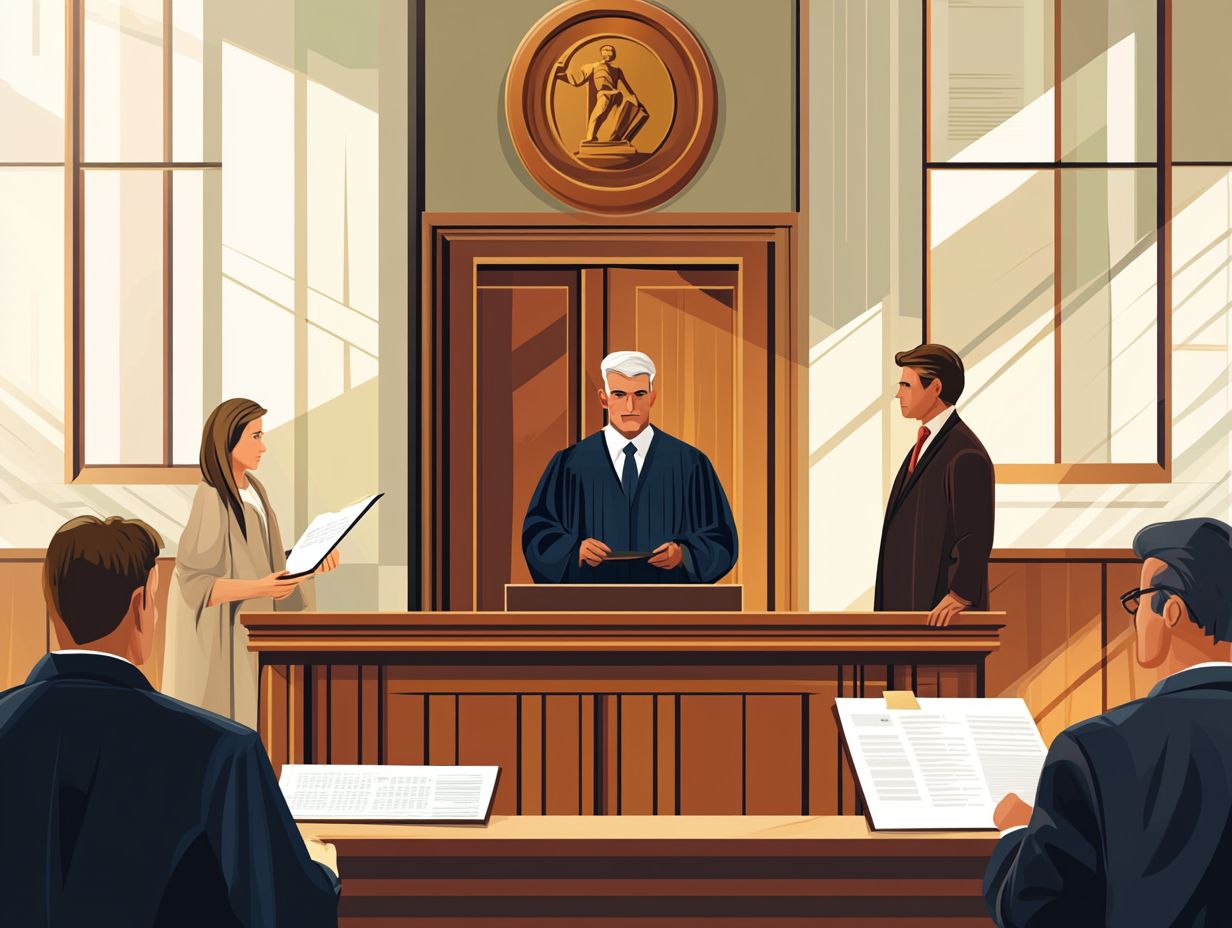
Understand the different types of intellectual property rights and their importance in protecting your creations and innovations.
Litigation plays a crucial role in safeguarding your IP rights, so be prepared to take legal action in case of disputes. Understanding the importance of IP education in litigation can further enhance your readiness.
To effectively protect your IP rights during litigation, gather strong evidence, work with legal counsel, and understand the importance of IP due diligence in litigation, as well as consider alternative dispute resolution options.
Understanding Intellectual Property Rights
Understanding Intellectual Property Rights (IPR) means grasping the essential principles that dictate the ownership and protection of diverse creative works, innovations, and business information.
Intellectual property includes copyright, trademarks, patents, and trade secrets. Each type provides specific legal protections for your work.
Enforcing these rights is crucial. It allows creators and businesses to secure exclusive rights over their works and maintain a competitive advantage in the marketplace.
This overview underscores the significance of intellectual property rights and their vital role in fostering innovation and driving economic growth.
Types of IP Rights
There are several types of intellectual property rights, each carefully designed to safeguard different facets of innovation and creative expression. These include copyright, trademark, patent, and trade secret protections.
These rights arm you with the legal tools necessary to protect your unique contributions, ensuring that no one can exploit your work without your explicit permission.
Take copyright, for example. It focuses on safeguarding original works of authorship, such as literature, music, and art. It grants you exclusive rights to reproduce and distribute your creations.
Now, consider trademarks. They protect your brand names, logos, and slogans tied to your goods or services, allowing consumers to recognize the source of what they re purchasing.
Utility patents, on the other hand, cover new inventions, processes, or enhancements. They grant you a competitive edge by preventing others from making, using, or selling your innovations.
Then there are trade secrets, which shield confidential business information that gives you an advantage like formulas, practices, and designs. This ensures that your valuable knowledge remains under wraps.
Each type of intellectual property is governed by its own legal frameworks and regulations, highlighting the importance of understanding these nuanced differences to effectively protect your intellectual assets.
Litigation and Intellectual Property Rights
Litigation refers to the process of taking legal action and serves as a vital tool in upholding intellectual property rights. It offers a formal pathway for you to address and resolve disputes stemming from IP violations, whether it involves copyright, patent, or trademark issues.
When infringement claims arise, entering the litigation process becomes essential for safeguarding your rights and securing your economic interests. This may involve taking legal steps such as sending cease and desist letters or pursuing the legal framework governing IP litigation through the courts.
Protect your ideas today! Learn more about how to enforce your rights.
Common IP Disputes
Common IP disputes arise from various forms of IP violations, including copyright infringement, patent infringement, and trademark disputes. These issues highlight the pressing need for strong protection plans.
These conflicts typically spring from unlicensed use of creative works, unauthorized replication of patented innovations, or misuse of registered trademarks.
Such scenarios can have significant legal implications. Statutory damages for copyright infringement can easily skyrocket into thousands of dollars per violation. Additionally, the expenses tied to lengthy patent litigation can drain resources and divert your focus from core business objectives.
It’s essential to explore your options quickly, such as negotiation, mediation, or even litigation for copyright infringement, to effectively protect your intellectual property and maintain your competitive edge in the market.
The Role of Litigation in Protecting IP Rights

The litigation process is a vital way to protect your IP rights, giving you the power to take legal action against any unauthorized use of your creations. To better understand the steps involved, check out what to expect during an IP litigation process with the help of a skilled intellectual property attorney.
These professionals expertly navigate the complexities of legal procedures and craft compelling arguments, ensuring that your rights are upheld in court.
They help you assess whether litigation is the best path for enforcement, weighing its potential benefits like deterring future infringement and securing financial damages against possible downsides, including high costs and lengthy timelines.
The stress of prolonged legal battles can weigh heavily on any business, emphasizing the importance of strategic planning and considering other ways to solve disputes without going to court when appropriate.
Steps to Protect Your IP Rights During Litigation
Protecting your intellectual property rights during litigation requires careful attention to several critical steps, including understanding the importance of a strong IP policy in litigation.
Start by gathering all pertinent evidence to establish a solid foundation for your case.
Working closely with your legal counsel is essential, as their expertise will guide you through the complexities of the process. Consider other ways to resolve disputes, as they can help you avoid lengthy and costly court battles.
Taking these measures will empower you to safeguard your rights effectively.
Gathering Evidence
Collecting evidence is crucial in IP disputes. It creates a clear record of violations and supports your claims.
The types of evidence you can collect are varied, ranging from documentary proof like patents and trademarks to digital traces found online, such as emails and social media communications. Testimonial evidence from witnesses who can back up your claims also plays a critical role.
Documenting all findings ensures that each piece of evidence can be effectively presented in court, safeguarding the integrity of your case. A well-organized presentation of evidence enhances the credibility of your claims and significantly influences the final judgment, impacting the overall outcome of your litigation.
Working with Legal Counsel
Choose an experienced IP attorney. They will guide you through the complex legal landscape and help protect your rights.
These legal professionals provide invaluable insights into how to safeguard your creations and inventions. They don’t just step in during disputes; they analyze case details and strategize the best course of action while working tirelessly to keep your litigation costs in check.
By employing proactive measures and crafting personalized protection strategies, they help ensure that your valuable assets remain secure from infringement. With their expertise, you can make informed decisions about enforcing your IP rights, striking the right balance between pursuing legal recourse and managing resources wisely.
Start protecting your IP today! Reach out to an attorney to discuss your options.
Alternative Dispute Resolution Options
Alternative dispute resolution (ADR) options, like mediation and arbitration, offer effective pathways for resolving civil matters related to intellectual property. These methods help you avoid the headaches of lengthy litigation.
They not only streamline the resolution process but also cultivate a collaborative atmosphere, allowing you to maintain valuable business relationships.
Take mediation, for example. It encourages open dialogue between both sides, facilitated by a neutral third party, helping you reach a mutually beneficial agreement.
On the other hand, arbitration provides a more formal structure, where an independent arbitrator reviews the evidence and makes a binding decision.
Many companies, including yours, often find these ADR methods to be cost-effective alternatives. They significantly slash legal expenses and save precious time.
Picture a tech firm and a startup resolving a patent dispute through arbitration. This choice saves them money and lets them focus on innovation and development.
Important Considerations for Protecting IP Rights
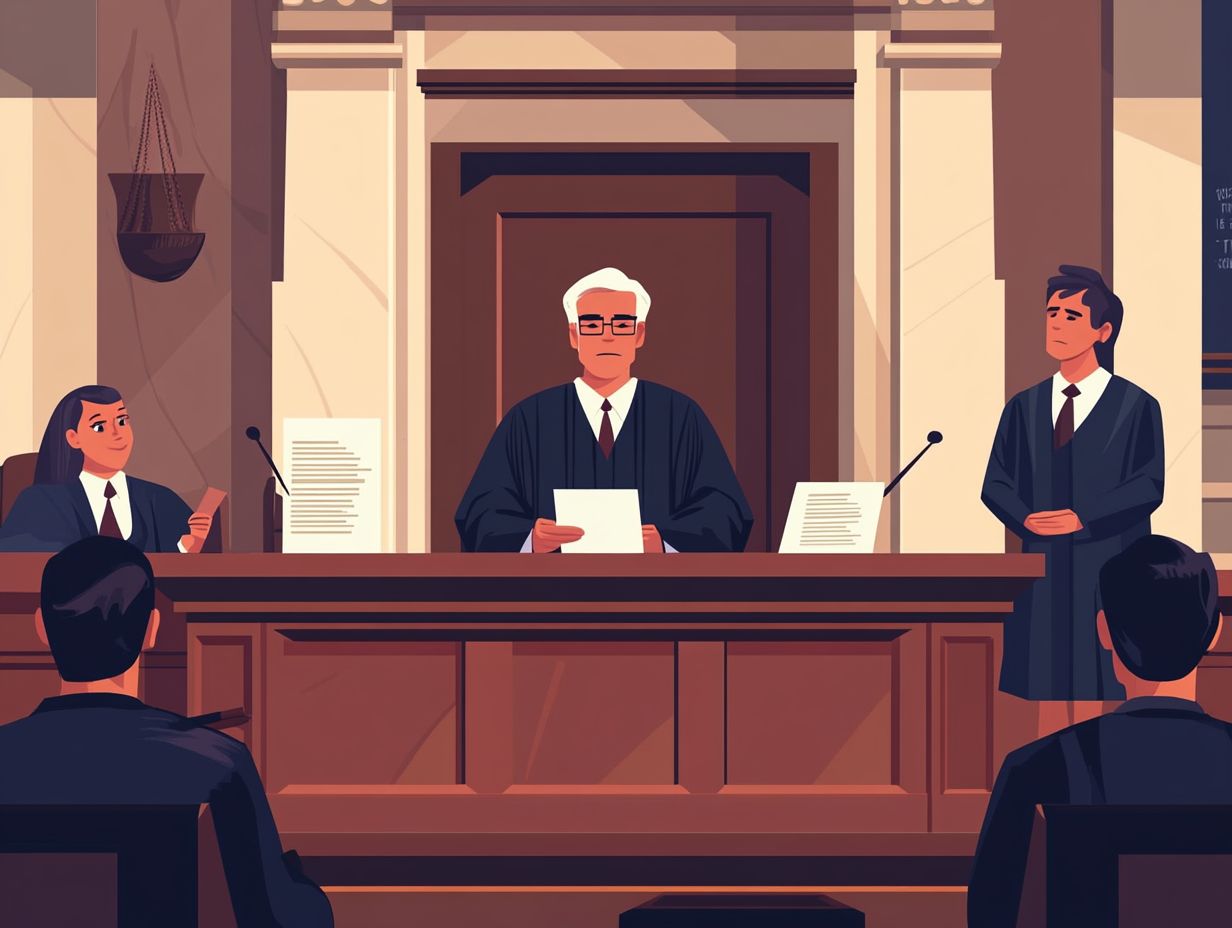
When safeguarding your intellectual property rights, it is crucial to consider international laws and regulations, especially regarding trade secrets and the legal remedies available against the theft of trade secrets or confidential business information.
Understanding these complexities can significantly enhance your protection strategy.
International Laws and Regulations
International laws and regulations governing intellectual property rights vary significantly across jurisdictions, greatly impacting how you enforce your IP rights globally.
Different countries align themselves with various international agreements, like the Agreement on Trade-Related Aspects of Intellectual Property Rights (TRIPS) and the Berne Convention. These agreements are essential in shaping your global IP strategy.
They set minimum standards for the protection and enforcement of IP rights. However, differences in local laws can create compliance challenges.
If you’re operating in markets with weaker enforcement mechanisms, you might find it difficult to safeguard your innovations effectively, potentially leading to losses from piracy or counterfeiting.
Adopt tailored strategies to navigate these complexities while adhering to international norms.
Protecting Trade Secrets
Protecting trade secrets is not just important; it is vital for your survival in the market! This requires thoughtful implementation of protective measures and a solid understanding of the legal remedies available against economic espionage and unauthorized use.
You should adopt specific strategies, such as training your employees on the importance of confidentiality and employing robust cybersecurity practices to safeguard sensitive information.
Nondisclosure agreements (NDAs) can serve as powerful tools in your arsenal. These contracts legally bind individuals to keep proprietary knowledge confidential, adding an extra layer of security to your operations.
In terms of trade secret theft, the stakes are high. Organizations like yours can face financial losses and reputational damage, reinforcing the need for constant vigilance.
Fortunately, legal remedies, such as injunctions or damage claims, are available for companies that have been victimized, underscoring the necessity of proactive measures to mitigate the risks associated with economic espionage.
Best Practices for Protecting IP Rights
To effectively protect your intellectual property rights, implement best practices such as conducting regular audits, keeping a pulse on market trends, and keeping careful records.
These steps will help you cultivate a robust IP portfolio that stands the test of time.
Start implementing these best practices today to safeguard your intellectual property.
Regular Audits and Monitoring
Regular audits and ongoing market monitoring are vital for protecting your intellectual property (IP) rights. They help ensure compliance with legal standards and quickly identify any potential infringements.
By systematically reviewing your processes, you can keep your IP practices current and well-protected against threats.
This proactive approach helps uncover vulnerabilities before they escalate into legal disputes. It also reinforces your commitment to innovation and integrity.
Thorough market surveillance is essential for spotting unauthorized use of trademarks, patents, and copyrights by competitors or counterfeiters.
Bringing in third-party experts in IP compliance can offer valuable insights and enhance your defensive strategies. This ultimately creates a more secure business environment.
Proper Documentation and Record-Keeping
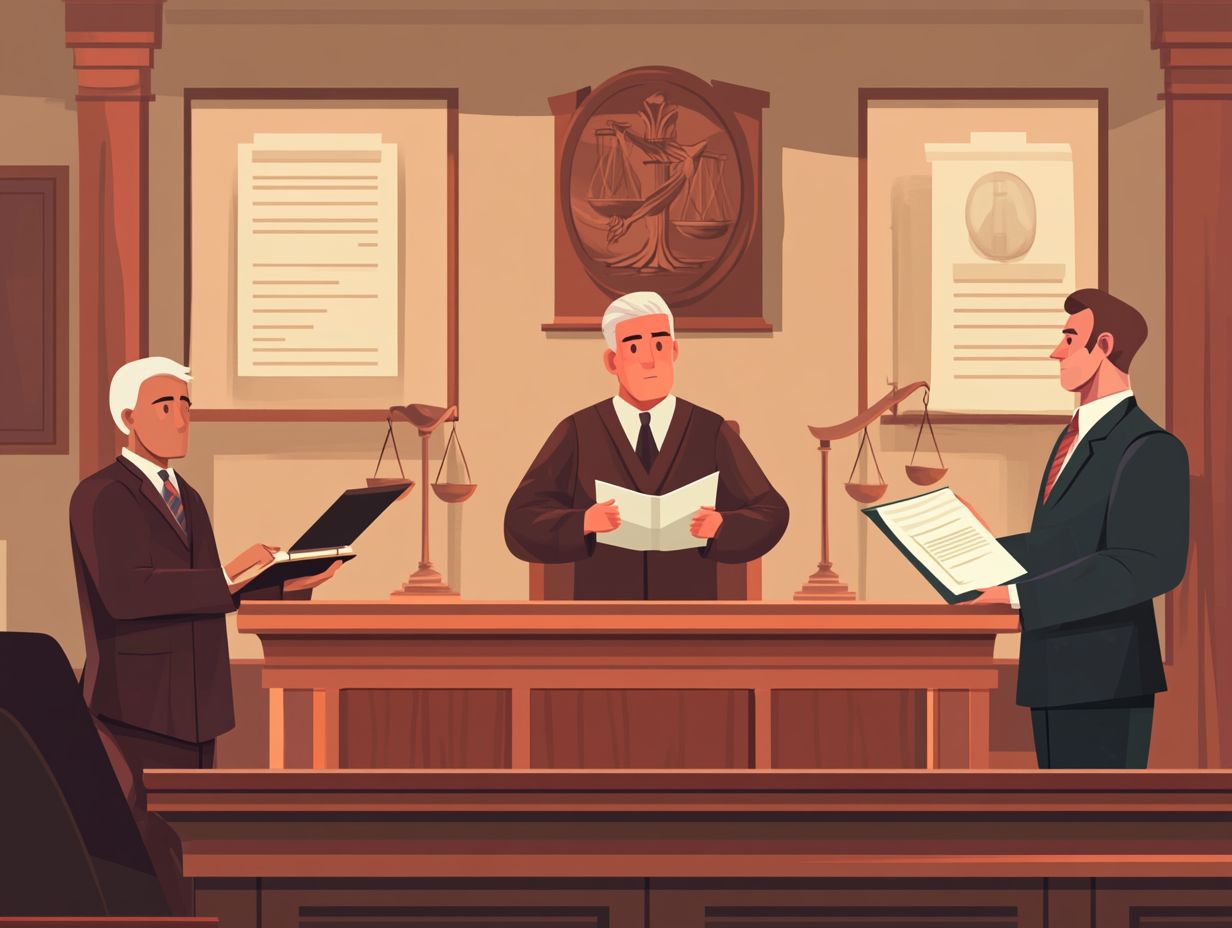
Proper documentation and record-keeping are essential for maintaining a strong IP portfolio. They effectively support legal action in cases of infringement.
To achieve comprehensive IP protection, engage with various forms of documentation. This includes registrations that formally establish ownership, licenses that outline usage rights, and agreements that clarify terms among collaborators. Each component plays a crucial role in safeguarding your intellectual property.
When meticulously maintained, these records create a solid framework for gathering potential evidence. Thorough record-keeping can significantly bolster your position in litigation, offering a clear timeline and tangible proof of ownership and rights. This enhances your chances of achieving a favorable outcome in disputes.
Frequently Asked Questions
What are IP rights and why is it important to protect them during litigation?
IP rights, or intellectual property rights, refer to the legal ownership and control of intangible assets such as inventions, literary and artistic works, designs, and symbols used in commerce. Protecting these rights during litigation is crucial to prevent unauthorized use or infringement, which can negatively impact the value and profitability of the assets.
What are the common types of IP rights that may be involved in litigation?
The most common types of IP rights involved in litigation include patents, trademarks, copyrights, and trade secrets. For a deeper insight into these rights and their legal aspects, refer to understanding IP litigation. These rights protect different forms of intellectual property and have varying legal mechanisms for protection and enforcement.
What steps can I take to protect my IP rights during litigation?
Firstly, ensure your IP rights are properly registered with the appropriate government agencies. This provides legal evidence of your ownership and facilitates enforcement. Additionally, understanding the importance of documentation in IP litigation can strengthen your position. Have clear policies and procedures in place for managing and protecting your IP assets. Finally, work with experienced legal counsel who can advise you on the best strategies for protecting your IP rights during litigation.
What are some common challenges to protecting IP rights during litigation?
Common challenges include difficulty proving ownership or infringement, complex legal processes, and high litigation costs. Cultural or language barriers may also arise in international IP disputes, making it essential to work with legal counsel experienced in these types of cases.
Can I still protect my IP rights if I cannot afford litigation?
Yes, alternatives to litigation can be pursued to protect your IP rights. Consider using alternative dispute resolution methods such as mediation or arbitration, which can be less costly and time-consuming. Additionally, consult your legal counsel to explore options like licensing or settlement agreements, and you may also want to learn about how to track IP litigation trends effectively for better strategic decisions.
What should I do if I believe my IP rights have been infringed upon?
If you suspect your IP rights have been infringed, act quickly and seek legal advice from an experienced IP attorney. They can help you gather evidence, assess the strength of your case, and determine the best course of action to protect your rights. Avoid confronting the alleged infringer directly, as this could potentially harm your case.



